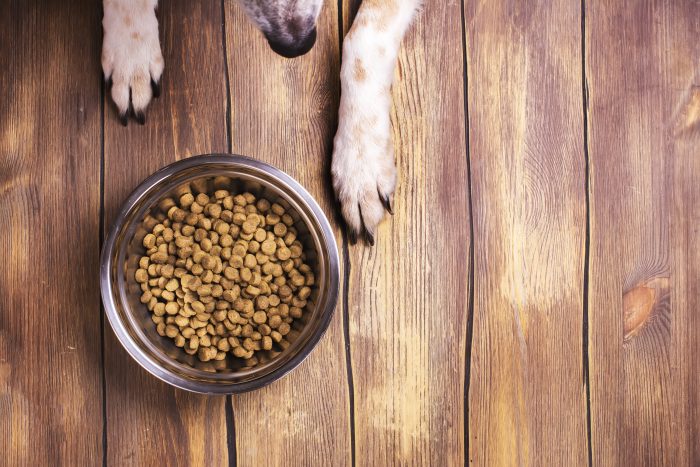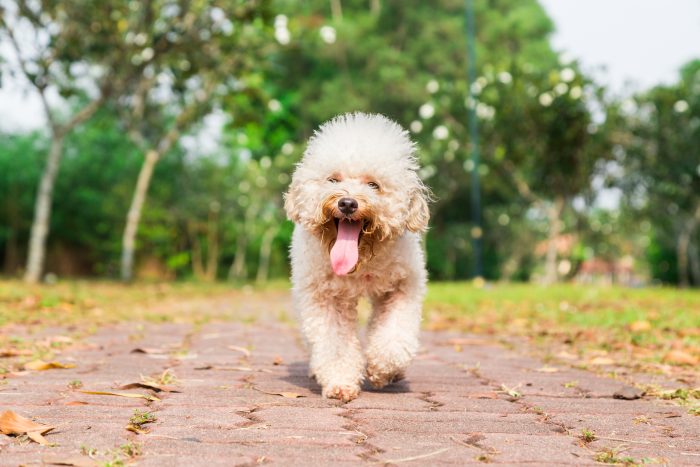While it may be hard to say no to your furry friend’s adorable face when they are begging for a second treat, that extra nugget of love isn’t making them any healthier. Obesity is commonly defined as an excess of body fat. While obesity is common in dogs of all ages, it usually affects dogs between five and ten years of age, and some breeds are more prone to obesity, like Dachshunds, Beagles, and Labs. Further, obesity can cause a myriad of conditions and diseases in your pooch. Fortunately, there are several steps you and your pup can take to get his or her weight under control.
Inch to Pinch on Your Pup?
Most veterinarians will be happy to let you use their scales to determine if your dog is on the heftier side. However, there is an easier way to determine if your dog is obese without trying to get them to sit still on the bathroom scale. When your dog is at healthy weight, you should be able to feel their ribs on the side of their chest easily. If you are looking over your dog, they should have a defined waist line and their overall shape should resemble an hourglass, not a pear. If your dog struck out on both these tests, it may be time to start altering his or her lifestyle.
A Healthy Hound is a Happier Hound
While it may seem your pup is jollier with a bit of jiggle, don’t let their happy demeanor fool you. Obesity in your dog can cause serious and long-lasting health issues. One of the most common complications is the development of diabetes mellitus or sugar diabetes. If you’ve noticed your pet peeing more frequently and losing their appetite, you’ll need to take them to their vet for a full diagnosis.
Despite diseases, the added weight can begin to damage your dog’s joints and bones. This is especially true in smaller breeds where only a few more pounds can begin to wreak havoc. This added pressure can lead to arthritis or hip dysplasia. And if that wasn’t enough, a severely overweight dog can get the same afflictions that affect obese people, such as hypertension, decreased stamina, and difficulty breathing.
Stop Super Sizing Supper
One great thing about being a pet parent is that you get to make the decisions for your pup, even if they don’t like them. The first step in getting your dog’s weight under control is to get their portions under control. Most dogs aren’t going to deny that extra kibble you serve them, so it us up to you to give them a healthy amount of food.
Talk with your vet about what type of dog food you are currently serving your pooch and how many calories they should really be eating per day. Fortunately, most dog food will have the calories per cup printed on the bag. You may get a little frown from your furry friend, but remember you are doing this to make their lives better. Oh, and don’t forget to count those treats and chews in their daily intake. In addition, consider bioavailability when shopping for your dog’s food. Use highly absorptive, hemp-only products like Canna-Pet® so you can keep your dog healthy without limiting their treats too much. Your dog will appreciate that you put their health first.
Let’s Get Physical
Your canine probably adores cuddling on the couch with you all afternoon, or catching some Zs in a sunbeam. But if you want your pudgy pup to shed those pounds, you are going to have to get them up and going. Obesity is usually caused by your pooch overeating and not exercising enough. In fact, as little as an extra 1 % increase in calories can result in a 25% increase in body weight. However, just like you can’t jump off the couch and into a marathon, don’t expect your pup to do the same.
Begin by taking your dog on a series of short walks with plenty of time to rest in between. Socializing your pup and throwing them the old ball are also great ways to get them motivated. You will need to be wary when the temperature is on the rise. An obese dog cannot regulate their temperature as well as a dog with a healthy weight, and will quickly become over heated if they exert too much.
Remember that you are in control of your dog’s health, both the good and the bad. Keeping your dog’s weight in check will have them enjoying a longer, more fulfilling life. And with their decreased weight, you’ll have lower veterinarian bills.






